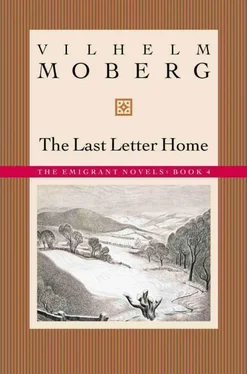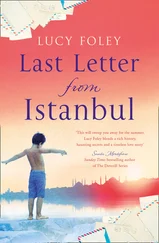The region these immigrants helped develop was admitted to the Union as the thirty-second state, and they themselves became citizens of the United States.
But this alone did not guarantee them peace and security in their new land. After ten years in the New World their existence was threatened to its very foundations. Within the Union such great antagonism had arisen between opposing factions that it resulted in a four-year, utterly bloody civil war. And while this was still going on, their own new, free state was shaken by another internal strife: The Indians who had been forced to vacate their ancestral hunting grounds by the ever-encroaching settlers started an uprising to drive them out and regain their land.
The gift of liberty so generously extended to the immigrants made great demands on the recipients: It saddled the settlers with responsibilities that had been unknown to them in their native country. The United States demanded of its citizens talents never needed in their homeland. In Sweden they had been subjects of temporal and spiritual authorities they themselves had not elected, and — like people not of age — they had had a government over them to decide what was best and most beneficial for them. Here in the New World they were citizens of age: They themselves elected their government, and they elected as their officials men who had their confidence and who would serve the people rather than hold them in obedience.
The ability wholly to govern themselves was exacted of the settlers. And the necessity to decide for themselves forced and stimulated them to new efforts and developed in them new strength. In exercising their newfound liberty the immigrants gained the experience which gave them the strength to build their new society.
Thus, in turn, the immigrant-citizens were changed by their new country. They changed the country and the United States of America changed them.
— 1—
It was in the beginning of the age of the telegraph. This remarkable invention was in use everywhere in North America; in a few short minutes it could transfer important news from one end of the country to the other. The morning happenings in the South were known in every city and village of the North long before evening. The telegraph was a miracle not yet become commonplace.
What happened in South Carolina on the morning of Sunday, April 14, 1861, was known to every city dweller in Minnesota within a few hours; the news reached many of the smaller villages before the day was over; more remote settlers were perhaps not aware of it for still another day. It reached the people of Lake Chisago in the forenoon of Monday the fifteenth. This April day was never to be forgotten by any one of those who lived it.
It was the season of seeding. Karl Oskar Nilsson, owner of the first settlement at the lake, was harrowing his field for the spring wheat. For the first time he was driving his recently acquired team of horses. The weather was mild for that time of year, it had rained moderately, and the soil seemed ready after the stirring of the harrow pegs. The black earth was pregnant with growing and sufficiently dry after the rain not to clog his shoes. Pigeons, meadowlarks, and sparrows faithfully followed the team across the field and picked with eager beaks at worms and larvae exposed by the harrow. The horses pulled this heavy implement easily enough with such a brisk pace that the driver had difficulty in keeping up with them. Karl Oskar still dragged his left foot a little due to an old injury in his leg which always made itself known under stress.
He was pleased with his new team. There was a great difference between the lively, brisk horses and the dull, sluggish oxen. Now harrowing was easy. This afternoon he must sow his wheat, for tomorrow morning the Spring Court convened in Center City and he was to serve on the jury.
He had sent his oldest boy, Johan, on an errand to Klas Albert’s store — Persson’s Store, as they called it in Center City — and now and then he glanced down the road. Why was the boy so slow in returning? Finally he spied him down by the old log cabin. As soon as Johan saw his father he began to run. Karl Oskar reined in his team: Why suddenly this hurry?
Before the boy had gained the field he began shouting: From the son the news reached the father: War had broken out.
Johan was excited and short of breath. In Center City he had read a poster on the bulletin board of the parish meetinghouse. The Southern rebels had stormed Fort Sumter and shot down the Union flag. The slave states had begun warring against the North. A great many people had gathered at Persson’s Store, all talking about the war. The boy of fifteen was proud to have carried this message; he panted for breath as he repeated it.
Karl Oskar let the team rest and sat down heavily on the harrow. To him the news was not unexpected. He had long feared war would break out. It had been an uneasy winter, full of anxiety and uncertainty. Now spring had come and with it outbreak of war. And as war finally had come, at least he was relieved of the worry about its breaking out.
Last fall he had been one of those who helped elect Abraham Lincoln, himself a settler’s son. The men of the ax and the plow had placed Abe in the President’s chair: They trusted him. Karl Oskar had thought: Old Abe won’t have a war, if he can help it. He is sure to make peace with the slave states. He also wants what is best for the South — the best of both North and South — they must remain united. He wants the people of the New World to settle their differences peacefully, not with bloodshed. In the Old World the English, French, Russians, Austrians, and Turks had recently fought bloody battles. But over there kings and warlords had always driven their people to death, and people had meekly endured it. But Honest Abe — himself born in a settler’s cabin — is not going to ape leaders who have ruined the Old World.
But now the slave states had inveigled each other to attack the Union. The flag had been shot down! What could the President do now? What must they all do? The one attacked must defend himself.
Johan was standing beside the harrow, keyed up, waiting eagerly and with apprehension: “Do you think, Father, the rebels are coming all the way up here?”
No, his father didn’t think so; the boy mustn’t be afraid. The Southern rebels would never come as far north as Minnesota. Long before they got halfway they would be killed on the battlefields. And he told his boy to go on home and finish cleaning out the sheep pen, a chore he had started in the morning. He must tell Harald to help him, there was great hurry, the sheep manure was to be spread on the oat field before seeding.
Johan looked disappointed but obeyed reluctantly. He had expected his father to unharness the team and come home and forget about the sheep pen. He had in some way expected a reward for bringing the message of war. It was unfair, on a day like this, to have to shovel sheep dung.
A swarm of mosquitoes buzzed around the horses and bit them in the groins; the animals stamped with their hind legs, rattling the harnesses. Karl Oskar remained sitting, squinting at the sun, his thoughts disturbed, pondering. War! Never could a war have started at a more inopportune moment. But whatever happened, he must plant the spring wheat today. A new crop must grow; people would need bread next year also.
He resumed harrowing but row after row with each furrow he was pursued by the question: How many men in America must now leave their daily chores and go to war? He did not stop harrowing until the dinner hour. Kristina, his wife, had already set the table as he entered the kitchen, and he sat down to eat with his family.
Читать дальше












